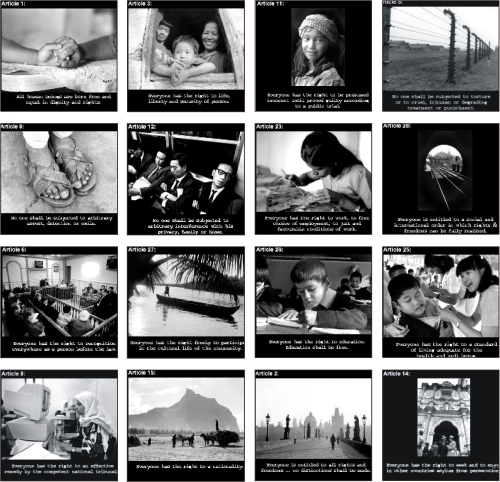Human Rights Analysis
Universal Declaration of Human Rights
 |
Photo: MakePovertyHistory.org |
Summary of Preamble
The General Assembly recognises that the inherent dignity and the equal and inalienable rights of all members of the human family is the foundation of freedom, justice and peace in the world, human rights should be protected by the rule of law, friendly relations between nations must be fostered, the peoples of the UN have affirmed their faith in human rights, the dignity and the worth of the human person, the equal rights of men and women and are determined to promote social progress, better standards of life and larger freedom and have promised to promote human rights and a common understanding of these rights.
A summary of the Universal Declaration of Human Rights:
1. Everyone is free and we should all be treated in the same way.
2. Everyone is equal despite differences in skin colour, sex, religion, language for example.
3. Everyone has the right to life and to live in freedom and safety.
4. No one has the right to treat you as a slave nor should you make anyone your slave.
5. No one has the right to hurt you or to torture you.
6. Everyone has the right to be treated equally by the law.
7. The law is the same for everyone, it should be applied in the same way to all.
8. Everyone has the right to ask for legal help when their rights are not respected.
9. No one has the right to imprison you unjustly or expel you from your own country.
10. Everyone has the right to a fair and public trial.
11. Everyone should be considered innocent until guilt is proved.
12. Every one has the right to ask for help if someone tries to harm you, but no-one can enter your home, open your letters or bother you or your family without a good reason.
13. Everyone has the right to travel as they wish.
14. Everyone has the right to go to another country and ask for protection if they are being persecuted or are in danger of being persecuted.
15. Everyone has the right to belong to a country. No one has the right to prevent you from belonging to another country if you wish to.
16. Everyone has the right to marry and have a family.
17. Everyone has the right to own property and possessions.
18. Everyone has the right to practise and observe all aspects of their own religion and change their religion if they want to.
19. Everyone has the right to say what they think and to give and receive information.
20. Everyone has the right to take part in meetings and to join associations in a peaceful way.
21. Everyone has the right to help choose and take part in the government of their country.
22. Everyone has the right to social security and to opportunities to develop their skills.
23. Everyone has the right to work for a fair wage in a safe environment and to join a trade union.
24. Everyone has the right to rest and leisure.
25. Everyone has the right to an adequate standard of living and medical help if they are ill.
26. Everyone has the right to go to school.
27. Everyone has the right to share in their community's cultural life.
28. Everyone must respect the 'social order' that is necessary for all these rights to be available.
29. Everyone must respect the rights of others, the community and public property.
30. No one has the right to take away any of the rights in this declaration.
Source: Human Rights Education Associates (HREA).